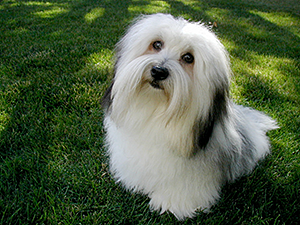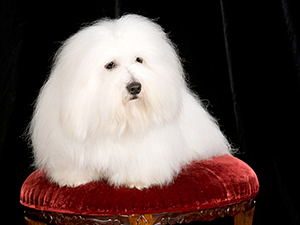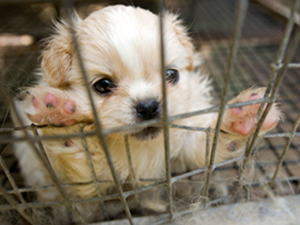
by Thea Feldman
The Coton de Tulear is a small, long-lived dog that, on average, stands about 10 inches high and weighs between 9 to 15 pounds. Its coat is on the long side and is most commonly white, black and white, or white with tan markings. Native to Madagascar, the dog is relatively rare, despite having what long-time breeder Hailey Parker describes as a wonderful temperament and personality. “They are funny and keep you laughing,” she says, pointing out their high-energy antics and overall expressiveness. She is quick to add, however, “Cotons are not for everyone. If you work full-time, you shouldn’t have one. They don’t like to be left home alone. And, since they are long-haired, the dogs’ grooming needs should be taken into consideration as well.” But, if a Coton is right for your lifestyle, says, Parker, “once you’ve had one you’ve been ‘cotonized.'”
The loveable little breed now finds itself at the center of a lawsuit that Parker and another long-time Coton owner and former breeder, Jeri McLees — both of whom belong to the non-profit American Coton Club (ACC) — have launched as individuals against the American Kennel Club (AKC) and the United States of America Coton de Tulear Club (USACTC). ACC and USACTC are two of the four Coton de Tulear clubs that have formed in the United States. ACC and one other club, the Coton de Tulear Club of America (CTCA) maintain their own registries to check the lineage of each dog in order to ensure that it is a purebred Coton. This is important, Parker maintains, not just to guarantee the pedigree of an individual dog for a prospective buyer, but also to help maintain the health of individual dogs and the breed as a whole. Right now, ACC and CTCA also have mandatory health checks for their registered dogs.
Chiefly for these reasons, ACC, CTCA, the majority of Coton breeders and individual companion Coton owners, as well as United Coton de Tulear Association for Rescue and Education (UCARE), the national rescue organization for Cotons, have decided to stay away from the AKC. The AKC has a reputation for being associated with puppy mills and other large-size commercial breeding operations, both of which are often cited for practices not good for the health of either fully grown dogs or the pups they are continually birthing. In addition, according to Parker, once a breed is part of the AKC it becomes hard to control the lineage of the population. There is both an increased chance of inbreeding as well as a risk that the purity of the breed will be diluted. “You simply may not be getting a purebred dog or a healthy dog if you get an AKC dog,” says Parker. She also believes that breeds that become part of the AKC begin to be bred so that their physical look is altered to maximize their appearance for the show ring, which can also lead to health problems.

Jane Arrington, co-founder of UCARE, believes that AKC recognition will exponentially increase the number of Cotons in puppy mills. “I have assisted in the staging areas after several puppy mill busts orchestrated by HSUS and ARC in the last eight years and have NEVER had to see a Coton in any of them,” she said. “The dogs I have seen raised in unspeakable conditions in those puppy mills — mostly small breeds such as Shih Tzus, Yorkshire Terriers, etc. numbering 250 to 1,000 in each facility — have physical and mental disabilities from which some never recover.”
So, why does the AKC associate with puppy mills? Melanie Kahn, Senior Director of the Stop Puppy Mills Campaign for The Humane Society of the United States (HSUS) explained. “The AKC is financially beholden to the puppy mill industry since much of their revenue comes from registrations from commercial breeders,” she said. “To make matters worse, the AKC has consistently opposed legislation that would have improved conditions for dogs living in large-scale breeding facilities. It is disheartening that an organization that claims to be ‘the dogs’ champion’ consistently takes positions contrary to that mantra.”
Despite all this, in 2009, the USACTC conducted a vote with its membership requesting permission to apply for “parent club” status with the AKC. A parent club is a club that acts as the “ambassador” club for the breed or the liaison for other clubs of its breed with the AKC. The members, which included Parker and McLees at the time, believed that was all they were voting on and were assured by the USACTC board that any further decisions, including whether or not to apply for breed status within AKC would require another vote of the membership.
But, according to Parker, this is not what happened. In 2011, without going back to its members, USACTC apparently applied for and received AKC recognition to be in the AKC’s Miscellaneous Class, which is the first step on the path to becoming a fully recognized breed of the AKC. As a member of the AKC Miscellaneous Class, USACTC was required to submit its registry records to the AKC. This too was allegedly done without the permission of its members. As part of the pending lawsuit, Parker and McLees want the records of their dogs expunged from the AKC registry. They contend that the AKC knowingly accepted this information that was not theirs to have.

While there is one joint lawsuit against the AKC and the USACTC, the two organizations have decided not to defend themselves together, so there are two separate, upcoming court dates in mid-March. The charges against USACTC include failure to disclose records, unfair business practices, misappropriation, fraudulent concealment, and intentional and negligent misrepresentation. The charges against the AKC are for unfair business practices and misappropriation.
The majority of Coton breeders and companion owners have long maintained that they do not want an association with the AKC. They have banded together and formed Advocates for the Coton de Tulear (ACT) to try to stop the USACTC from proceeding with AKC status. McLees, an active member of ACT, believes “there are no benefits for any breed to join AKC, only negatives. The humans might benefit from the glory of showing at Westminster, the largest AKC dog show, but after all, it’s just a beauty contest — fun but nothing more! There have been too many breeds that have been ruined by the accolades and popularity of a Westminster winner. It would break my heart,” she said, “if that happened to our Cotons.”
ACT currently has more than 1,900 signatures on a petition to put a halt to the recognition process. Find out more, sign the petition, and donate to the cause.
Parker admits to feeling like “David against Goliath” with the suits but is firm in her convictions that this is the best way to “protect and preserve the Coton and prevent health issues that come out of ‘mass production’ of dogs. Right now you rarely see a purebred Coton in a rescue group or in a shelter,” she says. “We want to stop the problems before they erupt.”

Several months ago, The Humane Society of the United States (HSUS) issued a report revealing that the AKC opposed 80 state and local bills in the last five years to establish some minimum humane breeding standards for the care of dogs in large-scale breeding operations. Since a large portion of AKC’s revenue comes from commercial breeder registrations, the organization is obliged to cater to this constituency — one that places profits above the welfare of dogs.
HSUS raids of illegal puppy mill operations have repeatedly found substandard operations with ties to the AKC. A recent raid of a Montana Malamute breeder, Mike Chilinski, who was convicted of 91 counts of animal cruelty, was a breeder who not only registered his dogs with the AKC, but was also inspected by the AKC. Chilinski actually told the court during his trial that AKC inspectors had been to his property and said everything was fine.
Sadly, the AKC’s recent list of the top 10 most popular breeds in America mirrors many of breeds that HSUS most commonly finds in puppy mills. Like the American Coton Club and the Advocates for the Coton de Tulear, the HSUS is not against showing or breeding dogs, but it needs to be done responsibly. Man’s best friend deserves no less.
 About the Author
About the Author
Thea Feldman is a lifelong animal lover, who is also a writer and editor. She has written many articles about animals and more than 100 books for children. She lives in New York with her favorite companion animal, Zoe Louise.

